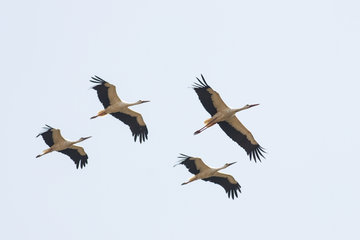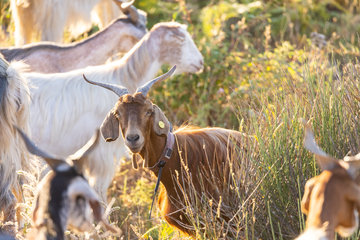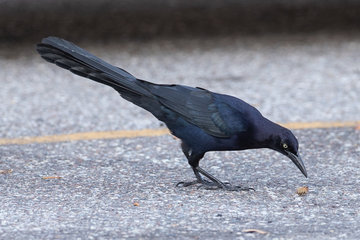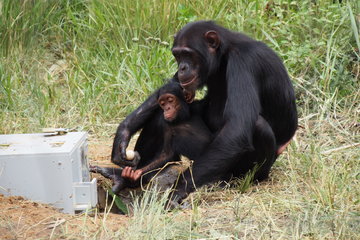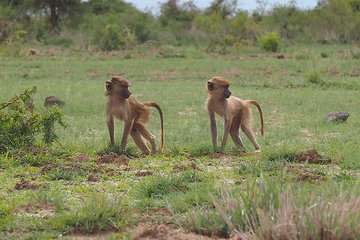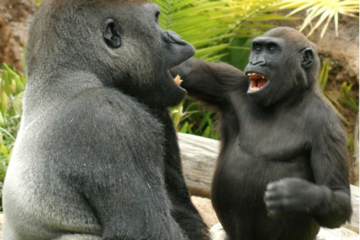Following the nightingale
Biologist Anna Proß, a PhD student at the MPI for Ornithology in Seewiesen, is interested in the vocal behaviour of nightingales. She wants to better understand the underlying neuronal processes. For her research, she followed the migratory birds to Ghana in Africa. She reports on early rising, sunrises, animal encounters, culinary revelations and African hospitality.
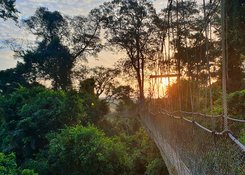
My research concerns the question as to how communication works and which neuronal processes it involves; to that end, I study the vocal behavior of male nightingales. The male birds attempt to out-sing one another, usually with the aim of defending their territories or attracting a female. Depending on their age, the males can have up to 200 different phrases in their repertoires, which they can also combine in any order. They can also adapt their songs spontaneously to match an opponent’s vocalizations. In terms of this ability, they are similar to humans; after all, we have no problem with reacting spontaneously in the course of a conversation.
Nightingales are one of the migratory bird species; they breed in Germany during the spring, for example in Brandenburg, and then fly to warmer climes, including Ghana, in the fall. Having already studied their vocal behavior during the breeding season, I then wanted to investigate how they communicate in winter. So I set off for Accra in early November, accompanied by the head of my research group, Daniela Vallentin, and another doctoral researcher.
The early bird catches the worm – to paraphrase and apply this proverb to my research stay, it would have to be worded: “the early researcher hears the nightingale.” We often had to leave at four o’clock in the morning to be at the target location by sunrise, as the birds are particularly active at dawn. Our chosen destinations were national parks, which are usually frequented by tourists. But due to the COVID-19 pandemic, the parks were almost deserted, which meant that we could lie in wait at our leisure.
If you hang around national parks in order to see birds at dawn, you’ll see other wildlife through your binoculars as well. For example, in addition to all kinds of colorful birds, we saw antelopes and monkeys. The ceiling in one cave was covered with bats, and we once spotted a group of crocodiles from a safe distance. But the most dangerous encounter we had was with a snake. We were walking through the rainforest when we heard something rustling in the bush. And then we saw it – a Green Mamba, one of the most venomous snakes in West Africa – and it was just two meters away! But the Mamba seemed to have at least as much respect for us as we had for it, because the snake fled before our guide could even react.

Our research stay was barely affected by the COVID-19 pandemic, as we were traveling in remote locations and avoided large crowds. At our hotels, we were often the only guests, which is why the operators focused all their attention on us. One time we were treated to a traditional drum concert while we savored an amazing fish dinner.
All in all, the trip was a culinary revelation. I was especially fond of plantains, which have a similar consistency to potatoes and – whether they are boiled, roasted, or deep-fried – are included in nearly every meal. I’ve already looked into where I can buy them in Munich and have every intent to include them in my own recipes. Apart from that, there are many soups and stews in Ghana, which are delicious, but often very spicy. For snacks, you can find a huge selection of fresh fruits all over the place, like pineapples, papayas, and coconuts.
At one point we stopped in a remote village at the edge of a cocoa plantation, where the residents gave us a warm welcome and took the opportunity to give us a tour of the plantation. It was harvest time, so we learned how to open the cocoa pods, which are about 30 centimeters long, how to separate the individual beans from the jelly-like pulp and how to dry them. Of course, we were also allowed to taste them.
This encounter is just one example of the amazing hospitality to which we were repeatedly treated throughout our time in Ghana. In addition to its fascinating scenery, dazzling flora and fauna and numerous culinary delights, there are lots of other good reasons to visit the country. One thing’s for certain: I’ll be returning to Ghana as soon as I possibly can.








